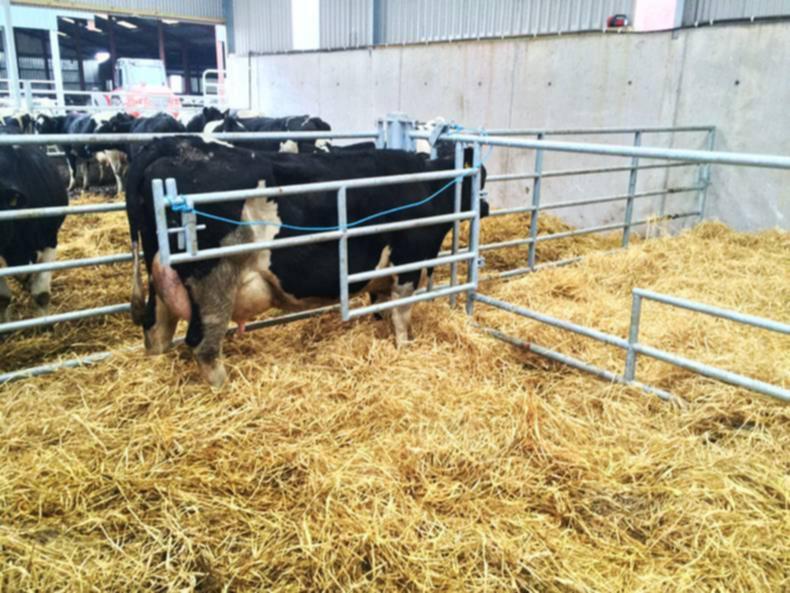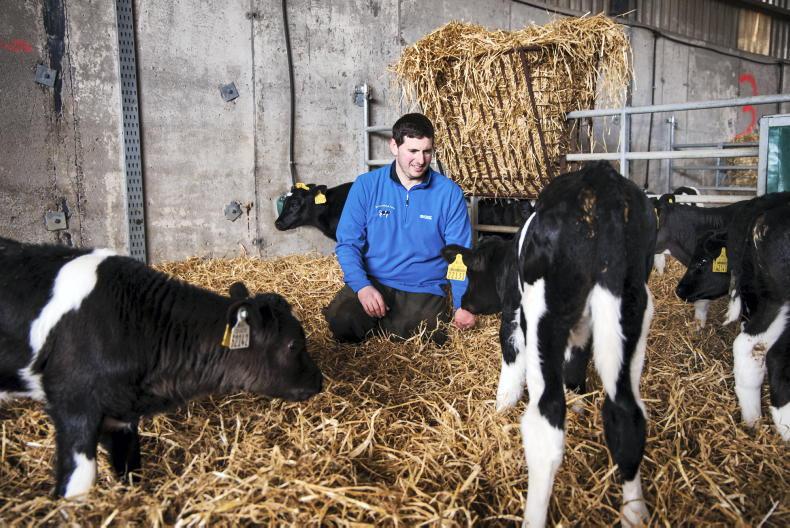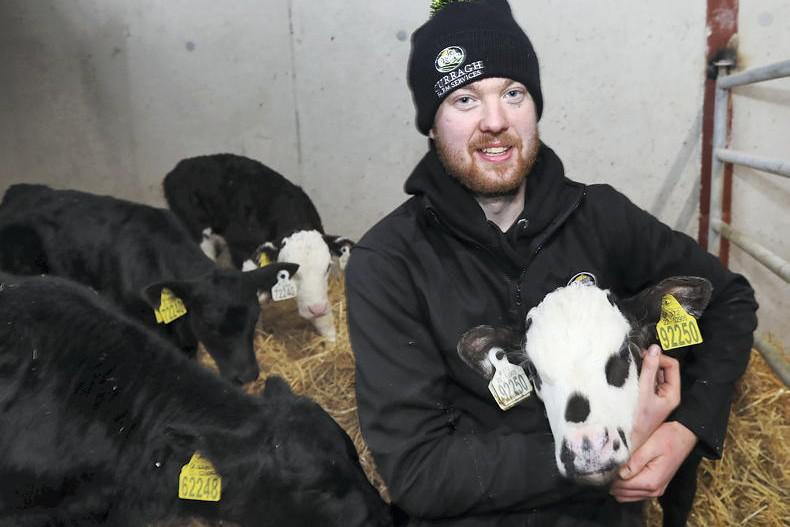Farmers will soon be buying calving gates under the Farm Safety Scheme. To qualify for the scheme’s 40% grant aid, the calving gate must meet the Department of Agriculture’s specification S138 – check with the manufacturer/supplier.
An important requirement is quick release of the hea gate at the top and bottom. It also specifies minimum size of gate tubing so that the gate can withstand the push of a big animal.
Vet Sean Roche, of Blackwater Veterinary in Ballivor, Co Meath, explained what he likes to see in a gate when called out to a calving.
“The head gate must be quick-release. A cow will asphyxiate in minutes if she goes down. It’s very difficult to get a big, heavy cow back standing up,” he said.
“I prefer to have the calving gate positioned against another gate, not against a wall. That’s for easier operation of a calving jack. A caesarean gate within the main gate is useful.
“The calving gate should be hung high enough to allow a calf to suck, even with build-up of straw. The gate should be held closed on the cow with a strong chain, which should be above the back. Where the chain is lower and a cow goes down while the vet has his arm inside, the arm can be broken.
“On the other hand, with the chain on top, the animal is free to back out until she has her head locked in the head gate.
“Don’t make calving pens too big. It’s more difficult to get a cow in the head gate – she has room to beat you. Telescopic gates help,” Sean said.
Most calving gates have a three-in-one design, with:
A quick-release head gate. A hinged inner gate, which swings closed on the cow as she is driven into the head gate, and is then tied closed. A small caesarean gate. Most gates are slanted up at the end to allow a calf to suck, or else have a separate gate for this purpose.
But gates vary in the diameter of tubing used while some are telescopic and some have a more elaborate head-gate arrangement.
Here is a guide to some of the better-known calving gates on the market. All meet the specifications and are galvanised, etc.
Pic 1: Gibney Steel
Products
The firm’s three-in-one calving gate comes in 12ft or 15ft versions with head gate, inner directional gate and caesarean gate.
The 15ft version will fit between pillars in a standard bay. The catching mechanism on the top bar of the head gate folds down to allow quick release – no spanner needed. The height of the gate off the ground is 1.5m.
Gibney Steel Products fits two chaining points for the inner holding gate – one at traditional waist height and one above the animal’s back.
Philip Smith said that the main frame of the gate and the filler bars are made with 48.3mm diameter tubing of 2.5mm wall.
“You need this heavy tubing to give long working life,” he said.
Gibney Steel Products sells through co-ops and farm shops. Recommended retail price for this gate is €510 for 12ft and €540 for 15ft, all plus VAT.
The firm also makes a telescopic calving gate with a 12ft to 16ft stretch.
Pic 2: Condon
Engineering
The Louth firm makes two types. First is a three-part gate suitable for dairy stock, which includes an internal forcing gate and a caesarean gate.
This gate is telescopic, available as 12ft to 14ft or 14ft to 16ft. Shorter gates are available as non-telescopic. The list price for the 12ft to 14ft gate is €450 plus VAT. The longer version costs €10 extra. Delivery anywhere costs €40.
The second gate is designed for bigger suckler cows. It has a separate, permanent pillar on the second side of the head gate, off which the gate portion hinges. This makes driving the cow into the head gate easier. List price is €500 plus VAT.
The two gates are made with 60mm tubing for the external frame and 42mm tubing for infill. Quick release of the head gate is operated by hand. There’s a quick-release pin at the bottom of the head gate’s locking bar. The head gate is closed with a rope, which goes back to the rear of the animal.
Pic 3: O’Donovan
Engineering
The Cork firm’s three-in-one calving gate comes in 10ft and 12ft lengths as standard, with others available on request. It can work as a pen division and is then usable from either side. The head gate has a spring-loaded pipe bar which can be opened by hand pressure to release a cow that has gone down.
The catch for the anchoring rope or chain is positioned so that it can hold a rope tied to one leg of a calf, to act as a third hand during a complicated calving.
The vertical bars of the gate – heel and toe bars – are made of heavy-duty 60mm tubing, the top and bottom bars from 48mm tubing and infill bars from 42mm.
List prices are €390 plus VAT for the 10ft gate and €415 for the 12ft gate. Delivery is extra.
Pic 4: O’Donnell
Engineering
The Tipperary firm makes a heavy-duty three-in-one gate from 8ft to 15ft, with other lengths available on request.
The head gate can be locked into the floor slab by lowering a 28mm latch bolt. The full height of the gate then swings closed to force the cow into the head gate.
Alternatively, just the internal directional gate may be used, leaving the outer frame in place as a pen divider or front.
Where the gate is used as a pen division, the crush head gate is operational from both sides, ie from both pens.
The head gate, which has a hand-operated quick-release, is lockable from behind the animal. This is a six-bar gate made with 38mm blue band tubing.
John O’Donnell recommends using a 13ft gate in 13ft square pens. “One calving gate will do up to 60 cows, serving perhaps five calving pens,” he said.
List price for the 12ft and 13ft versions is €390 plus VAT.
Pic 5: Performance Steel
The Meath firm sells two gates. Its patented telescopic Pro-Calver 100 gate has a head gate with permanent posts on both sides.
This means the full height of the gate is available to be swung closed, driving the cow into the head gate. It has a caesarean gate and a calf sucking gate.
The top of the gate is set at 6ft when installed. The gate comes in a number of sizes (11ft to 13ft, 13ft to 16ft, etc). The telescopic action gives 3ft of stretch.
This is a heavy-duty gate that will cope with the strongest cows and will have a long working life.
It’s made with 60mm diameter tubing of heavy 3.5mm wall right throughout. List price is €850 plus VAT, with delivery extra.
The firm also manufactures a standard three-in-one gate at €550 plus VAT.
The firm has moved the fixing point for the anchoring rope or chain to the top of the gate, in line with the new Department of Agriculture specifications. This gate, too, is made with 60mm diameter tube.
The head gate in both is quick-release operated by finger pressure. In addition, the locking bar in the head gate curves out at the bottom so that it doesn’t squeeze the cow’s throat if she goes down.
Pic 6: Connacht Agri
The Galway firm makes two different gates. Its 10ft calving gate is a three-in-one design made using 2.6mm gauge tubing.
If used as a pen division, it can be used from either pen. The head gate has a quick-release at the top and can be quickly disassembled if the cow goes down.
The middle gate is designed with a step to allow for sucking. It is secured to the wall with a chain.
The second option is the divided calving gate. This system allows the farmer to make use of the feeding passage, as well as the calving cubicle. Prices €450-700.
O’Neill Weighing Systems
The Co Kilkenny firm sell two types. For €588 plus VAT it sells a heavy-duty three-in-one Jourdain gate which is telescopic covering 10-14ft and has a permanently fixed head gate. It is made with a 60mm outside frame. For €280 plus VAT it sells a simpler three in one gate made with 48mm outside frame, suitable for smaller herds.
Farmers will soon be buying calving gates under the Farm Safety Scheme. To qualify for the scheme’s 40% grant aid, the calving gate must meet the Department of Agriculture’s specification S138 – check with the manufacturer/supplier.
An important requirement is quick release of the hea gate at the top and bottom. It also specifies minimum size of gate tubing so that the gate can withstand the push of a big animal.
Vet Sean Roche, of Blackwater Veterinary in Ballivor, Co Meath, explained what he likes to see in a gate when called out to a calving.
“The head gate must be quick-release. A cow will asphyxiate in minutes if she goes down. It’s very difficult to get a big, heavy cow back standing up,” he said.
“I prefer to have the calving gate positioned against another gate, not against a wall. That’s for easier operation of a calving jack. A caesarean gate within the main gate is useful.
“The calving gate should be hung high enough to allow a calf to suck, even with build-up of straw. The gate should be held closed on the cow with a strong chain, which should be above the back. Where the chain is lower and a cow goes down while the vet has his arm inside, the arm can be broken.
“On the other hand, with the chain on top, the animal is free to back out until she has her head locked in the head gate.
“Don’t make calving pens too big. It’s more difficult to get a cow in the head gate – she has room to beat you. Telescopic gates help,” Sean said.
Most calving gates have a three-in-one design, with:
A quick-release head gate. A hinged inner gate, which swings closed on the cow as she is driven into the head gate, and is then tied closed. A small caesarean gate. Most gates are slanted up at the end to allow a calf to suck, or else have a separate gate for this purpose.
But gates vary in the diameter of tubing used while some are telescopic and some have a more elaborate head-gate arrangement.
Here is a guide to some of the better-known calving gates on the market. All meet the specifications and are galvanised, etc.
Pic 1: Gibney Steel
Products
The firm’s three-in-one calving gate comes in 12ft or 15ft versions with head gate, inner directional gate and caesarean gate.
The 15ft version will fit between pillars in a standard bay. The catching mechanism on the top bar of the head gate folds down to allow quick release – no spanner needed. The height of the gate off the ground is 1.5m.
Gibney Steel Products fits two chaining points for the inner holding gate – one at traditional waist height and one above the animal’s back.
Philip Smith said that the main frame of the gate and the filler bars are made with 48.3mm diameter tubing of 2.5mm wall.
“You need this heavy tubing to give long working life,” he said.
Gibney Steel Products sells through co-ops and farm shops. Recommended retail price for this gate is €510 for 12ft and €540 for 15ft, all plus VAT.
The firm also makes a telescopic calving gate with a 12ft to 16ft stretch.
Pic 2: Condon
Engineering
The Louth firm makes two types. First is a three-part gate suitable for dairy stock, which includes an internal forcing gate and a caesarean gate.
This gate is telescopic, available as 12ft to 14ft or 14ft to 16ft. Shorter gates are available as non-telescopic. The list price for the 12ft to 14ft gate is €450 plus VAT. The longer version costs €10 extra. Delivery anywhere costs €40.
The second gate is designed for bigger suckler cows. It has a separate, permanent pillar on the second side of the head gate, off which the gate portion hinges. This makes driving the cow into the head gate easier. List price is €500 plus VAT.
The two gates are made with 60mm tubing for the external frame and 42mm tubing for infill. Quick release of the head gate is operated by hand. There’s a quick-release pin at the bottom of the head gate’s locking bar. The head gate is closed with a rope, which goes back to the rear of the animal.
Pic 3: O’Donovan
Engineering
The Cork firm’s three-in-one calving gate comes in 10ft and 12ft lengths as standard, with others available on request. It can work as a pen division and is then usable from either side. The head gate has a spring-loaded pipe bar which can be opened by hand pressure to release a cow that has gone down.
The catch for the anchoring rope or chain is positioned so that it can hold a rope tied to one leg of a calf, to act as a third hand during a complicated calving.
The vertical bars of the gate – heel and toe bars – are made of heavy-duty 60mm tubing, the top and bottom bars from 48mm tubing and infill bars from 42mm.
List prices are €390 plus VAT for the 10ft gate and €415 for the 12ft gate. Delivery is extra.
Pic 4: O’Donnell
Engineering
The Tipperary firm makes a heavy-duty three-in-one gate from 8ft to 15ft, with other lengths available on request.
The head gate can be locked into the floor slab by lowering a 28mm latch bolt. The full height of the gate then swings closed to force the cow into the head gate.
Alternatively, just the internal directional gate may be used, leaving the outer frame in place as a pen divider or front.
Where the gate is used as a pen division, the crush head gate is operational from both sides, ie from both pens.
The head gate, which has a hand-operated quick-release, is lockable from behind the animal. This is a six-bar gate made with 38mm blue band tubing.
John O’Donnell recommends using a 13ft gate in 13ft square pens. “One calving gate will do up to 60 cows, serving perhaps five calving pens,” he said.
List price for the 12ft and 13ft versions is €390 plus VAT.
Pic 5: Performance Steel
The Meath firm sells two gates. Its patented telescopic Pro-Calver 100 gate has a head gate with permanent posts on both sides.
This means the full height of the gate is available to be swung closed, driving the cow into the head gate. It has a caesarean gate and a calf sucking gate.
The top of the gate is set at 6ft when installed. The gate comes in a number of sizes (11ft to 13ft, 13ft to 16ft, etc). The telescopic action gives 3ft of stretch.
This is a heavy-duty gate that will cope with the strongest cows and will have a long working life.
It’s made with 60mm diameter tubing of heavy 3.5mm wall right throughout. List price is €850 plus VAT, with delivery extra.
The firm also manufactures a standard three-in-one gate at €550 plus VAT.
The firm has moved the fixing point for the anchoring rope or chain to the top of the gate, in line with the new Department of Agriculture specifications. This gate, too, is made with 60mm diameter tube.
The head gate in both is quick-release operated by finger pressure. In addition, the locking bar in the head gate curves out at the bottom so that it doesn’t squeeze the cow’s throat if she goes down.
Pic 6: Connacht Agri
The Galway firm makes two different gates. Its 10ft calving gate is a three-in-one design made using 2.6mm gauge tubing.
If used as a pen division, it can be used from either pen. The head gate has a quick-release at the top and can be quickly disassembled if the cow goes down.
The middle gate is designed with a step to allow for sucking. It is secured to the wall with a chain.
The second option is the divided calving gate. This system allows the farmer to make use of the feeding passage, as well as the calving cubicle. Prices €450-700.
O’Neill Weighing Systems
The Co Kilkenny firm sell two types. For €588 plus VAT it sells a heavy-duty three-in-one Jourdain gate which is telescopic covering 10-14ft and has a permanently fixed head gate. It is made with a 60mm outside frame. For €280 plus VAT it sells a simpler three in one gate made with 48mm outside frame, suitable for smaller herds.
















SHARING OPTIONS